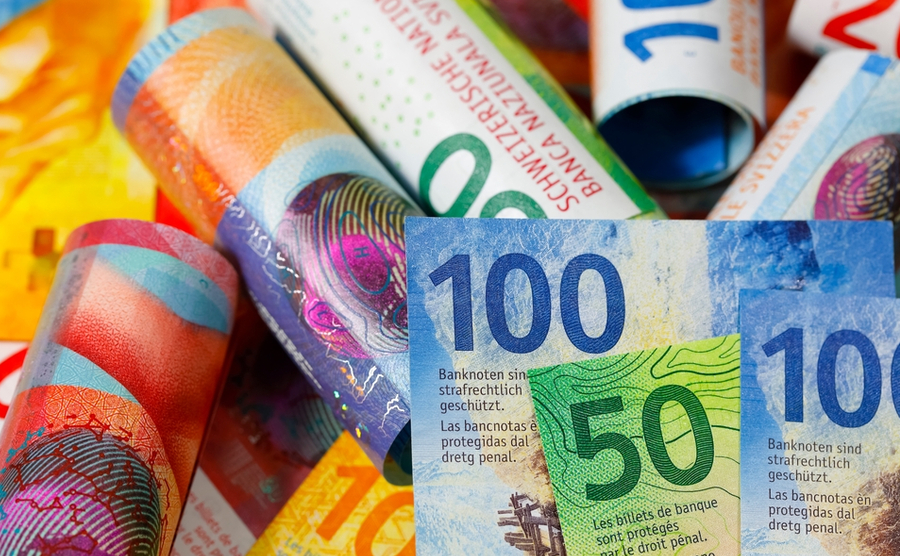
Swiss francs is considered a 'safe-haven' currency
In volatile times for the global economy, whether due to war, pandemic or economic downturn, those with wealth want to keep it safe. When it comes to currencies, investors turn to one of a very few ‘safe haven’ currencies.
A safe haven asset is a type of investment that is expected to hold or increase in value during times of market instability, or risk. There are several types of safe haven investments that investors turn to, to diversify their portfolios. Gold is the most well-known, but more prosaic items such as corn and cattle are also safe. Some stocks, known as ‘defensive’ stocks, are safer than others, such as in food industries and healthcare. Government bonds and treasury bills are another, and so is currency.
A currency is generally considered a safe haven if the economy behind it is stable, able to withstand turbulent times and unexpected (‘black swan’) events such as the Covid-19 pandemic. Independence from trading blocs, a secure political system and a diverse economic base are all part too. The country holding large amounts of foreign currency itself, helps, as it can sell it to buy back its own currency when required.
In times of economic instability, investors rush to these currencies, and as we all know, increased demand makes them more likely to hold or increase in value.
The US dollar (USD) is the most obvious and widely traded safe haven currency. As the threat of Russia invading Ukraine grew in February 2022, USD soared. As you might expect, the euro, on the edge of the conflict, weakened. But the dollar strengthened against almost all other currencies, not just the euro.
What are the safe haven currencies?
The US dollar
The start of the pandemic, the start of the Ukraine war, the threatened start of a global recession – all sent investors converting cash holdings to dollars.
The greenback is backed by the world’s largest economy and is viewed as the world’s reserve currency, so investors tend to lean on it during times of instability.
Swiss franc
Switzerland has a large, stable and safe banking industry, as well as being the base of many international organisations. It tends to have a low-volatility capital market, extremely low levels of unemployment and trade balance figures which tend to land on the positive side. It is independent of the European Union, but works well with the EU, as part of the European Economic Area (EEA).
Japanese Yen
There are some occasions when the USA has bad news, especially economic or around security, or both. In those cases, rather than the dollar, investors seek out the yen (JPY) as a safe haven. This happened during the global economic crisis in 2008.
Japan’s strong and stable economy as a technology powerhouse on the Pacific rim, is a key factor in the yen’s safe haven status. It also has large foreign reserves itself and is willing to buy back yen when required.
Even so, JPY’s status as a safe haven has come under threat, especially in the past year, where it has lost out heavily to the US dollar. Part of that may be down to the particular issues of the past year – with energy prices rocketing and Japan having no fossil fuel of its own. The yen has also suffered from the Bank of Japan’s extremely dovish stance on interest rates, which are still at -0.1%.
However, a different crisis and the yen could be a safe haven again.
The euro
In normal times the euro would be seen as a safe haven currency. It is part of a stable democracy and contains three of the G7 countries – Germany, France and Italy. However, a war on its doorstep in Ukraine and threats to European industry from Russia cutting off gas supplies has damaged its status, for now.
Why isn’t sterling a safe haven?
The evidence has been that investors have sold the pound in recent crises, from real ones like the war in Ukraine to speculative ones such as worries over China’s threat to Taiwan.
According to some sources, the writing was on the wall for sterling as soon as Prime Minister David Cameron offered an EU referendum in 2013 and risked severing trade links with the UK’s biggest trading partner.
The British economy is also heavily dependent on service industries (in a similar way, a currency like the Norwegian krone is prevented from being seen as a safe haven due to its dependence on commodities), the UK has few energy supplies of its own and has suffered political instability in recent years.
How can you protect your business against currency fluctuations?
Smart Currency Business work with SMEs and businesses to create tailored currency hedging strategies such as forward contracts to help manage and mitigate foreign exchange (FX) risk.
If your business is exposed to foreign exchange risk or market volatility, call our team today on 020 7898 0500. We will be delighted to help you mitigate that risk and protect your business’ bottom line.

 020 7898 0500
020 7898 0500